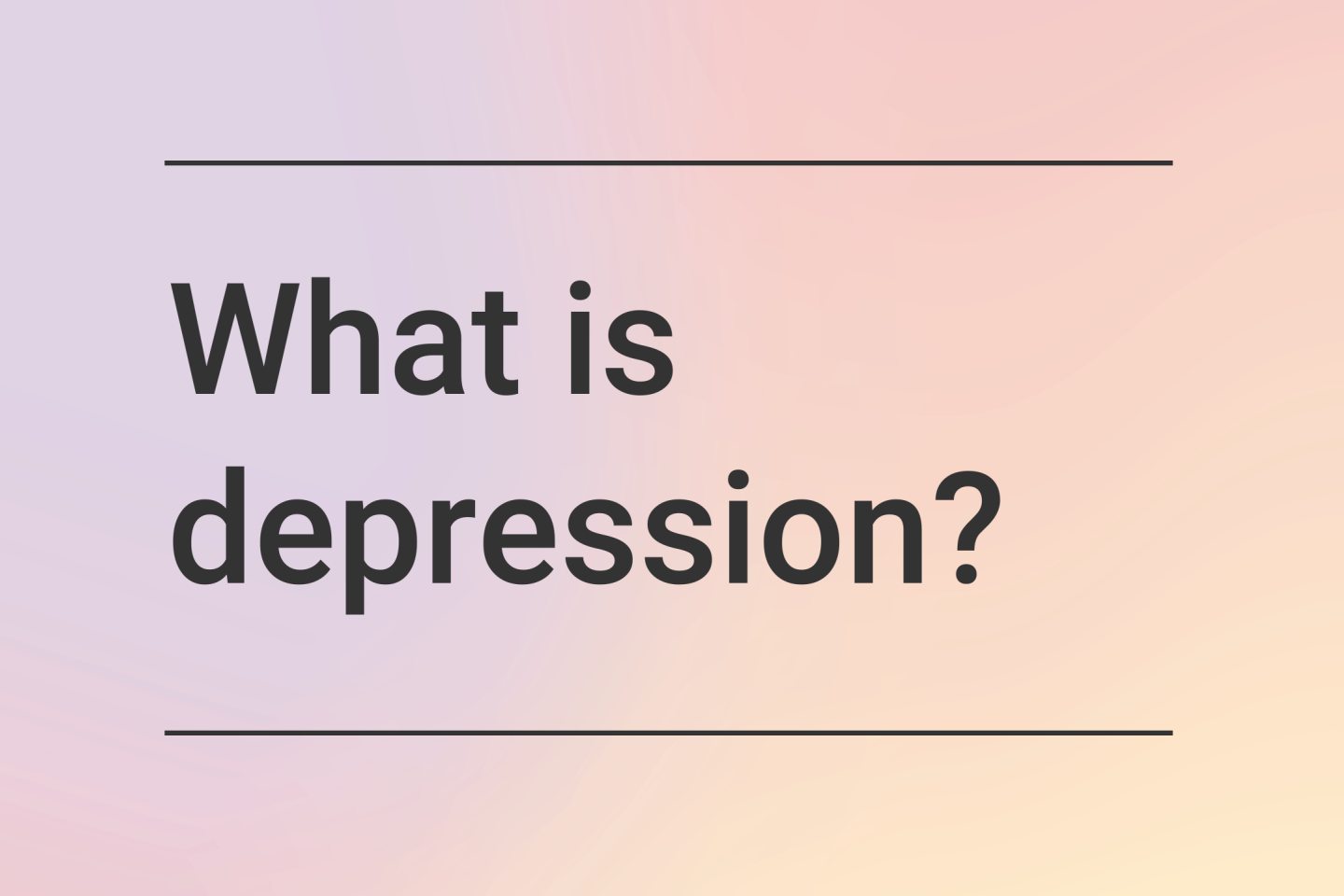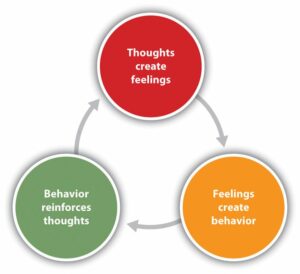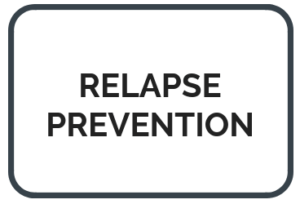Depression is a serious mental health condition that affects millions of people in the United States each year. It can cause feelings of sadness, emptiness, and hopelessness that can last for weeks or months at a time. Cognitive-behavioral therapy (CBT) is a type of therapy that has been shown to be effective in treating depression. In this blog post, we will discuss how CBT for depression works and the benefits it can provide for those suffering from depression.
Contents
What Is Depression?
 Depression is more than just feeling sad or blue. It’s a serious mental health condition that can have a profound effect on your mood, thoughts, physical health, and behavior. This condition is serious and also common, affecting more than 16 million adults in the United States each year.
Depression is more than just feeling sad or blue. It’s a serious mental health condition that can have a profound effect on your mood, thoughts, physical health, and behavior. This condition is serious and also common, affecting more than 16 million adults in the United States each year.
And around the globe, depression is the leading cause of disability. It’s important to remember that depression is not a sign of weakness and you can’t just “snap out” of it. Depression is a real medical condition that requires treatment. It is characterized by a number of symptoms that can vary in severity. These include changes in:
- mood
- appetite and weight
- sleep patterns
- energy level and activity
- ability to concentrate or make decisions
- feelings of hopelessness, worthlessness, or guilt
- thoughts of death or suicide
If you’re experiencing any of these symptoms, it’s important to seek professional help. Depression is treatable and there are a number of effective treatments available. One of the most common and effective treatments for depression is cognitive-behavioral therapy (CBT).
What Is Cognitive-Behavioral Therapy (CBT)?
Cognitive-behavioral therapy is a type of psychotherapy that helps people change negative thinking and behavior patterns. CBT is based on the idea that our thoughts, feelings, and behaviors are all interconnected. And that negative thinking can lead to negative emotions and behaviors.
CBT is a short-term treatment that focuses on specific problems. It is usually provided in 12-20 weekly sessions, although some people may need more or fewer sessions. During CBT, you will work with your therapist to identify and change negative thinking patterns and behaviors that are contributing to your depression.
It has been shown to be an effective treatment for depression. In fact, research has shown that CBT for depression can be as effective as medication in treating depression. And unlike medication, the effects of CBT tend to be long-lasting.
If you are considering CBT for your depression, it is important to find a therapist who is experienced in this type of therapy.
What Are The Techniques Used In CBT For Depression?
 It is believed that the way we think affects the way we feel. Therefore, by changing the way we think, we can change the way we feel. This is the basis of cognitive-behavioral therapy (CBT), which is a type of therapy that is used to treat depression.
It is believed that the way we think affects the way we feel. Therefore, by changing the way we think, we can change the way we feel. This is the basis of cognitive-behavioral therapy (CBT), which is a type of therapy that is used to treat depression.
CBT for depression typically involves several different techniques. Some of these techniques include:
Cognitive restructuring
This is a technique that is used to identify and challenge negative thoughts. The goal is to replace negative thoughts with more positive and realistic ones. More often, it is used to help people with depression see situations in a more positive light.
In depression, people used to have negative thoughts like “I am such a failure” or “Nobody likes me.” After cognitive restructuring, they would start to think “I did my best” or “Some people might not like me but that doesn’t mean everyone does not.”
So, the therapist will help you to identify those negative thoughts and challenge them.
Behavioral activation
This is a technique that is used to increase positive behaviors and decrease negative behaviors. The goal is to increase your level of activity and participation in pleasurable activities.
For example, if you are depressed, you may not feel like doing anything. You may just want to stay in bed all day. Behavioral activation can help you get out of bed and start doing things that make you feel better.
It is used to increase pleasurable and rewarding activities. The goal is to help people with depression feel better by doing things that make them happy. For example, if someone with depression enjoys going for walks, they may be encouraged to do this more often.
Problem-solving
The problem-solving technique of CBT is an effective way to deal with the challenges of depression. It helps you break down a problem into smaller parts, making it more manageable. You then work on solving each part systematically. This technique can be very helpful in dealing with negative thinking patterns that are common in depression.
Moreover, this skill of problem-solving can be useful in other areas of your life, such as work or relationships. For instance, you may be able to use it to deal with conflicts more effectively.
These three types of techniques are widely used for treating depression. However, there are other methods that may also be useful. For instance, some people find that art therapy or music therapy helps them cope with their symptoms. It is important to work with a therapist who can tailor the treatment to your needs and preferences.
But, of course, CBT for depression is actually more than just these three techniques. It works in different ways according to the patient. Let’s discuss how CBT for depression actually works.
How Does CBT For Depression work?
 This is an essential thing people want to know about CBT for depression. So, how does this type of therapy work? To put it simply, cognitive behavioral therapy helps people learn how to better manage their thoughts and emotions.
This is an essential thing people want to know about CBT for depression. So, how does this type of therapy work? To put it simply, cognitive behavioral therapy helps people learn how to better manage their thoughts and emotions.
One way CBT helps with depression is by developing a better understanding of your depression. It can teach you about how your thoughts, emotions, and behaviors are interconnected. This knowledge can give you a greater sense of control over your condition.
In addition, CBT can help you learn how to change negative thinking patterns and behaviors. This can result in improved coping skills and a more positive outlook on life. The goal is to help you eventually manage your depression on your own, without needing the help of medication or other treatment methods.
About CBT Sessions
CBT generally consists of meeting with a therapist for weekly sessions. These sessions last for about an hour, and you will typically participate in CBT for depression for 12 to 16 weeks. In some cases, though, people may need to continue therapy for longer periods of time.
CBT may also be conducted in group settings or through computer programs. Some therapists also offer “couple’s therapy” sessions, in case you are struggling with depression and your relationship.
A therapist may also ask you to keep a journal for homework assignments. This can help you track your thoughts and progress in therapy. Because this journal will help the therapist ultimately help you, be sure to be as honest as possible in your entries.
So, this type of therapy is very effective for a lot of people. If you think you might benefit from CBT for depression, talk to your doctor or mental health professional about finding a therapist who specializes in this type of therapy.
What Other Disorders Can CBT Treat?
As CBT is a very versatile form of therapy, it can be used to treat a wide range of disorders. Some common disorders that CBT has been proven to be effective in treating are:
- Anxiety Disorders
- Bipolar Disorder
- Eating Disorders
- Schizophrenia
- Social Skill Problems
- Personality Disorders
- Obsessive-Compulsive Disorder (OCD)
- Phobias
- Post Traumatic Stress Disorder (PTSD)
- Sleep Disorders
- Substance Abuse Disorders
CBT has also been shown to be helpful in treating depression that is comorbid with another disorder, such as anxiety. In fact, it is often the treatment of choice for patients who suffer from both depression and anxiety.
Studies have shown that this type of therapy can be just as effective as medication in treating depression, and it has the added benefit of helping to treat other disorders at the same time.
However, people need to be clear that CBT is not a “quick fix” solution, but it can offer lasting benefits for people struggling with depression. With commitment and effort, cognitive behavioral therapy can be an extremely effective treatment for depression.
Thus, if you feel that CBT is the right treatment for you, don’t hesitate to ask your doctor or mental health professional about it. It could be the key to unlocking a happier, healthier life.
What Are The Benefits?
 The benefits of CBT for depression and for even more severe mental disorders have been shown in many studies. In general, CBT has been found to be an effective treatment for depression, with a large body of research supporting its efficacy.
The benefits of CBT for depression and for even more severe mental disorders have been shown in many studies. In general, CBT has been found to be an effective treatment for depression, with a large body of research supporting its efficacy.
Some of the benefits it holds are listed below:
More effective than medication
Medications are usually the first line of defense against depression. However, they don’t work for everyone, and they can have undesirable side effects. CBT has been found to be more effective than medication in treating depression, and it has none of the side effects that come with taking medication. In fact, CBT for depression is believed to work by helping people change the negative thoughts and behaviors that contribute to their depression.
Short-term treatment
CBT is typically provided in weekly sessions for 12 to 20 weeks, although the number of sessions can vary depending on the severity of the person’s depression. This makes CBT a relatively short-term treatment option, compared to other types of therapy or medication. Although the treatment is short-term but the impacts are long-lasting.
Increased self-esteem
People with depression often have low self-esteem. CBT can help you see yourself in a more positive light and increase your self-confidence. As it helps you to develop healthy coping mechanisms, CBT can also reduce your reliance on unhealthy coping mechanisms such as alcohol or drugs. Also, it is believed that increased self-esteem will help protect you from future episodes of depression.
Develops rational thought processes
This is often an area of difficulty for people with depression. They tend to have negative thoughts about themselves, the world, and the future. CBT aims to help develop more positive and rational thought processes. This is actually the first step in CBT. The therapist will help the patient to recognize negative thoughts and start to change them into more positive ones.
Relapse prevention
 When you recover with CBT, you don’t just stop your old patterns and thinking. You learn new techniques and perspectives that help you deal with future challenges so that they don’t become full-blown problems. In other words, you build up your resilience. As this helps you to develop new coping skills so that you’re less likely to relapse, it’s an important part of the puzzle.
When you recover with CBT, you don’t just stop your old patterns and thinking. You learn new techniques and perspectives that help you deal with future challenges so that they don’t become full-blown problems. In other words, you build up your resilience. As this helps you to develop new coping skills so that you’re less likely to relapse, it’s an important part of the puzzle.
Otherwise in comparison to other types of therapy, where the focus is on the here-and-now and what’s going on right now. CBT looks more at the future and how you can prevent problems from developing or becoming worse.
Anger management
This is often an essential benefit of CBT for depression. Many people who suffer from depression also struggle with anger and other negative emotions. CBT can help manage these emotions in a more positive way. For example, it will teach you how to better control your anger and use it in a constructive way. And your therapist will also help you work out any underlying issues that may be causing your anger.
CBT can also help improve your communication skills. This is important because part of depression is feeling isolated and alone. By learning how to communicate better, you will be able to connect with others on a more positive level.
This, in turn, can help reduce the symptoms of depression. In addition, CBT can also help you develop coping skills. These are important because they will help you deal with difficult situations in a more positive way. For example, if you are faced with a stressful situation, you will be able to use the coping skills you learned in CBT to manage it in a more constructive way.
Are There Any Risks?
 Generally, therapies are considered safe. However, there may be some risks associated with cognitive behavioral therapy for depression. These risks include:
Generally, therapies are considered safe. However, there may be some risks associated with cognitive behavioral therapy for depression. These risks include:
Feeling worse before feeling better
This could be the result of exploring difficult memories and emotions. However, it is usually only temporary. It can happen because the therapist is challenging your negative thoughts and beliefs. And you might not be used to thinking in a more positive way.
Relying on the therapist too much
Therapies are of great help but the person has to be willing to change and do the work. Otherwise, there may be a dependence on the therapist that could hinder progress. More often, CBT for depression is considered short-term so that the person can eventually be independent.
Disclosure of confidential information
Your therapist will keep what you say confidential, but there may be some risks if you discuss sensitive topics. And there might be chances that your therapist will share your information with other professionals to ensure you’re getting the best possible care. If you have any concerns about confidentiality, be sure to discuss them with your therapist before beginning therapy.
Changing roles in a relationship
Cognitive-behavioral therapy for depression may cause changes in your relationships with family and friends. These changes can be good or bad. You may find that you spend more time with friends who support your recovery. On the other hand, you may pull away from friends or family members who don’t understand what you’re going through.
It is important to discuss any concerns with your therapist before beginning treatment. They can help you decide if CBT is right for you. However, this is an effective treatment according to studies for those who are struggling with depression. But be sure to discuss all the pros and cons with your therapist to make the best decision for you.
CBT can be an effective treatment for depression, but it is not a magic cure. You will need to put in the work to see results. But the benefits can be worth it if you are struggling with depression.
How To Find The Right Therapist?
 If you are considering CBT for depression, it is important to seek out a therapist who can be a good match for your type of depression. As there are various types of depression. Some of the tips to find the right therapist is listed below:
If you are considering CBT for depression, it is important to seek out a therapist who can be a good match for your type of depression. As there are various types of depression. Some of the tips to find the right therapist is listed below:
- CBT is most effective when the therapist and patient work together as a team. So, make sure you feel comfortable with your potential therapist.
- The therapist should have experience in treating depression. You can ask about their training and experience in CBT or other types of therapy.
- The therapist should be able to provide a clear explanation of how CBT works and what you can expect from therapy.
- It is important that you feel like the therapist understands your depression and can help you develop healthy coping strategies.
- Also, you should be aware of the cost of therapy and whether your insurance will cover it. If you are considering CBT for depression.
- Be clear about the techniques and treatment that will be used. There are many different CBT techniques, so it is important that the therapist is using techniques that have been proven to be effective in treating depression.
- Do your research and make sure you are getting the best possible treatment.
- Take your time as this is an important decision. The right therapist can make a big difference in your treatment.
So, it is important to find the right therapist with whom you feel comfortable and who can help you change your negative thoughts and behaviors. It has been proven to be an effective treatment for depression. Thus consider your goals and get the best possible treatment.
Conclusion
To conclude, CBT for depression is widely known to be effective. In addition to medication, CBT can help you manage your depression and improve your quality of life. If you are considering CBT for depression, make sure to consult with a mental health professional to see if it’s the right treatment for you.
It is believed that CBT for depression works by helping you change the negative thoughts and beliefs that contribute to your depression. So, choose wisely and get professional help.
For more information, please contact MantraCare. Depression is a mental illness characterized by persistent feelings of sadness, hopelessness, and loss of interest in daily activities. If you have any queries regarding Online Depression Counseling experienced therapists at MantraCare can help: Book a trial Depression Therapy session


